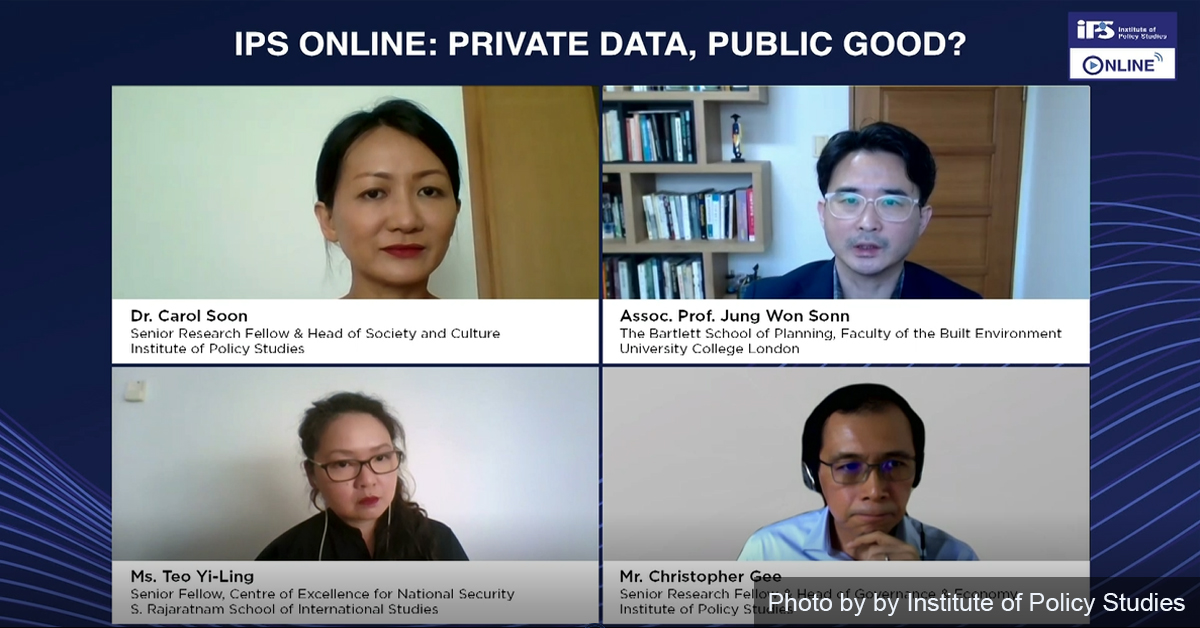
The second IPS Online series discussed the use of personal data for public good during the current health crisis and its implications beyond COVID-19. Titled Private Data, Public Good? the 60-minute session was moderated by Dr Carol Soon, Senior Research Fellow and Head of Society and Culture at IPS.
All panellists agreed that while there was no perfect way to strike a balance between sharing personal data and serving the public good, efforts must continue to get it right. This is especially so as the world will face more challenges beyond COVID-19 — new pandemics and climate emergencies, for example. Aggregated personal data could lead to improved and better amenities that would benefit both individuals and society at large, said Mr Christopher Gee, Senior Research Fellow and Head of Governance and Economy at IPS.
This has happened in South Korea, which managed to contain its first wave of COVID-19 infections effectively through the collective use of personal data. Associate Professor Jung Won Sonn, from The Bartlett School of Planning, University College London, said South Korea had learned hard lessons from the Middle East Respiratory Syndrome or MERS outbreak in 2015, after which legislation was passed to allow the authorities to access citizen data for future national emergencies.
South Koreans, therefore, were ready to allow their location data — accessed from their mobile phones as well as credit card transactions — to be shared once COVID-19 started spreading in China.
However, a recent second outbreak, linked to bars in a nightlife district in Seoul, has brought questions about privacy to the forefront amid concerns that some LGBTQ people might be outed against their will. This shows that privacy safeguards need to be constantly adjusted as new and unforeseen circumstances emerge.
There was also a robust discussion on the barriers that prevent Singaporeans from contributing their personal data. This included citizens’ lack of understanding of what privacy means and their fears over data security.
Ms Teo Yi-Ling, Senior Fellow at the Centre of Excellence for National Security at the S. Rajaratnam School of International Studies said the government has to assure citizens that it can be trusted to protect their personal data. One way to do this is to be transparent about what is collected, how it will be used and for what purpose.
Separate from the government, Dr Soon said private app developers should also include more explicit policies on what information they are collecting from users.
At the same time, the COVID-19 crisis provides individuals an opportunity to take responsibility and think harder about the information they are sharing.
Ms Teo said citizens have to better understand how their data is collected and used and to realise the importance of giving consent. Mr Gee echoed this sentiment and proposed the idea of a digital citizen’s charter, which could collectively represent the principles by which people could guard and share their personal data.
There was also a brief discussion on whether the government should make the TraceTogether mobile app mandatory for citizens to download, even though it is not a “silver bullet”.
Associate Professor Sonn felt that it should not be mandatory, as in countries like South Korea, citizen’s location data is already collected via mobile phone towers through their mobile phone. Ms Teo said it should only be made mandatory if there is a concrete reason to do so, such as if the spread of COVID-19 worsens.
Mr Gee felt it should be made mandatory and that most Singaporeans would accept it, albeit reluctantly. However, he conceded that doing so could set a dangerous precedent, leading to a “big brother” scenario.
Ultimately, the panellists were cautiously optimistic that measures to collect personal information will be further improved and tightened in the near future, with new ideas emerging on how such data can be better protected, while still serving the greater good.
Ms Teo called this a “tabula rasa” moment in the world where communities can re-examine old ways of doing things and take advantage of our inter-connectedness to address vulnerabilities in existing systems and fix longstanding problems in society.
Nadzirah Samsudin was previously Research Assistant at the Institute of Policy Studies in Singapore.
This piece was first published in Institute of Policy website.
Top photo by Institute of Policy Studies.
